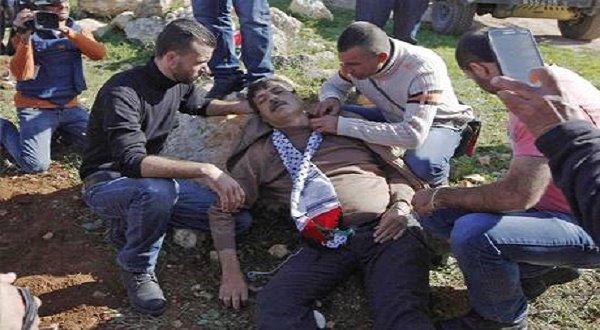RAMALLAH (IINA) – The Palestinians on Thursday accused Israel of “killing” Ziad Abu Ain who died a day earlier in a confrontation with troops during a protest march in the West Bank. Abu Ain was the minister, whose portfolio included organizing protests against Israeli settlements and the West Bank separation barrier.
“After hearing the results of the post-mortem, the Palestinian government holds Israel fully responsible for the killing of Abu Ain,” AFP quoted the government spokesman Ihab Bseiso as telling reporters. Meanwhile, the Israeli military said paramilitary border policemen have clashed with 60-100 rock-throwing Palestinians in the West bank city of Hebron. Thursday’s clashes come a day after Cabinet member Abu Ain died following a scuffle with Israeli troops during a protest elsewhere in the West Bank. There were no immediate reports of injuries or arrests in the Hebron clashes
In a separate development, Israeli and Palestinian officials issued conflicting accounts over the results of an autopsy on Abu Ain’s death, according to Reuters news agency. Hussein al-Sheikh, a top Palestinian official, told Reuters that Jordanian and Palestinian doctors involved in the late night examination of the body said Abu Ein, 55, had died from being struck, inhaling tear gas and not receiving prompt medical attention. But an Israeli medical source familiar with the autopsy results told Reuters the minister died from a heart attack which may have been brought on by the stress of being grabbed by the neck. Abu Ain’s death has stirred Palestinian anger at a time of strained relations with Israel.
Palestine President Mahmoud Abbas said all options were open for a Palestinian response to the killing Wednesday of Abu Ein. “All options are open for discussion and implementation,” he said amid speculation that security cooperation with Israel could be shelved. Abbas described the death as “a barbaric act that cannot be tolerated or accepted.”
EU foreign affairs head Federica Mogherini demanded an “immediate” inquiry into the incident. “Reports of excessive use of force by Israeli Security Forces are extremely worrying: I call for an immediate, independent investigation into… Abu Ein’s death,” she said. “I expect all sides to exercise maximum restraint at this time and to avoid all actions that would further raise tensions.”
In a separate development, Israeli and Palestinian officials issued conflicting accounts over the results of an autopsy on Abu Ain’s death, according to Reuters news agency. Hussein al-Sheikh, a top Palestinian official, told Reuters that Jordanian and Palestinian doctors involved in the late night examination of the body said Abu Ein, 55, had died from being struck, inhaling tear gas and not receiving prompt medical attention. But an Israeli medical source familiar with the autopsy results told Reuters the minister died from a heart attack which may have been brought on by the stress of being grabbed by the neck. Abu Ain’s death has stirred Palestinian anger at a time of strained relations with Israel.
Palestine President Mahmoud Abbas said all options were open for a Palestinian response to the killing Wednesday of Abu Ein. “All options are open for discussion and implementation,” he said amid speculation that security cooperation with Israel could be shelved. Abbas described the death as “a barbaric act that cannot be tolerated or accepted.”
EU foreign affairs head Federica Mogherini demanded an “immediate” inquiry into the incident. “Reports of excessive use of force by Israeli Security Forces are extremely worrying: I call for an immediate, independent investigation into… Abu Ein’s death,” she said. “I expect all sides to exercise maximum restraint at this time and to avoid all actions that would further raise tensions.”


